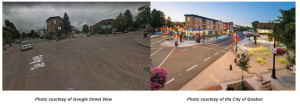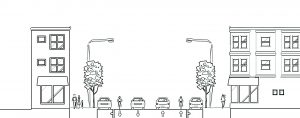Québec City is the capital city of the province of Québec. It is the seventh largest metropolitan area in Canada, and the second largest city in Québec. Complete Streets are referred to as “Rues Conviviales” in Québec.
Québec City
Chemin de la Canardière, Québec
The case study conducted on Chemin de la Canardière was one of the nine studies included in Montreal Urban Ecology Centre’s report analyzing complete street transformations across the province of Quebec.
Project Information
- Street Category: Commercial street
- Project length: 857 m
- Total cost: $5.2 M
- Cost per km: $6 M
- Year of implementation: 2018
Before After

Background
Québec City adopted a Complete Streets policy in 2017, a first in Québec. The purpose of the initiative was to “create an efficient and equitable transportation network that encourages active and multi-modal travel, that enhances people’s comfort and makes them feel safer, that supports sustainable development and promotes coexistence” [translation]. This new approach breaks down into three axes of development: active travel, greening and winter travel. The redevelopment of the Chemin de la Canardière was part of the development of Place Limoilou at the intersection of 6e rue, Chemin de la Canardière and 3e avenue in Québec. The redevelopment plan drew on the results of a participatory process. This process involved collecting the impressions of citizens and merchants over the course of two summers (2015 and 2016) during which temporary facilities were installed.
Pedestrian infrastructure
The project increased safety by installing shortened pedestrian crossings at intersections. Obstacles (streetlights, waste bins, etc.) were moved to facilitate foot travel and snow removal.
Universal accessibility
Tactile surfaces at intersections facilitate travel for users with reduced mobility.
Cycling infrastructure
Bike lanes were installed on both sides of the roadway. These connect the main cycling routes of 3e avenue and 8e avenue.
Public transit
The number 19 bus route of the Réseau de transport de la Capitale (RTC), established in 2016, serves the Chemin de la Canardière, connecting Limoilou with the haute-ville de Québec (Québec’s upper town).
Landscaping and furniture
The project includes new urban furniture, such as benches, waste bins, protective barriers and bicycle stands, as well as a new lighting system. Trees and vegetative strips improve the quality of the landscape and reduce the effect of heat islands.
Participatory process
In November 2016, the preliminary proposals were presented to citizens and merchants to elicit their comments and ideas on how to improve the project.
Key element: Street classification
The complete streets approach adopted by the Québec City is supported by various urban development plans that have been implemented since 2008. These tools include the Guide de conception géométrique des rues (2008), the Guide pratique sur l’accessibilité universelle (2010), the Plan de mobilité durable (2011), the Vision du développement de l’art public (2013), the Vision de l’arbre (2015), the Vision des déplacements à vélo (2016), and the Étude de faisabilité Tramway / SRB (2015). In addition, Québec is the first city in North America to develop a method of “multicriteria analysis mapping” to classify streets and identify which ones are suitable to a complete streets approach.
Cross section: Corner of 6e Rue

Total pavement: +/-20 metres
Québec City adopted an ambitious Complete Streets policy in March 2017. The City intends to remake 25% of its streets into “Rues Conviviales” in the coming years. As of July 2017, two projects have been completed, seven projects are underway, and three additional projects were slated to start in 2018. Complete Streets projects include a variety of street types, ranging from residential streets to suburban arterials.
Québec City’s policy is based around three principles: creating green streets, encouraging active transportation, and designing for four-season use. These principles contribute to the City’s overarching goal of healthy sustainability. So far, completed and underway projects have placed a heavy emphasis on increasing tree coverage and greenery. Québec City’s Complete Streets are also designed with the City’s harsh winters in mind, and incorporate features to make streets more accessible during winter months.
Québec City is also the first city in North America to use a multi-criteria, cartographic analysis to prioritize streets, developed with a research team from Laval University’s business school and planning program. The team used specialized decision-making software which requires only qualitative judgments to evaluate the relative attractiveness of options. This innovative approach was validated with the National Complete Streets Coalition (NCSC) and was presented in a joint NCSC/TCAT webinar in January, 2018.
The decision-making tool is not the only metric for Complete Streets used by Quebec City. A participatory design approach is employed by the City to allow citizens to meaningfully engage in the shaping of their streetscapes. The City has adopted context-dependent guidelines to ensure Complete Streets projects are appropriately designed with their environments in mind.
